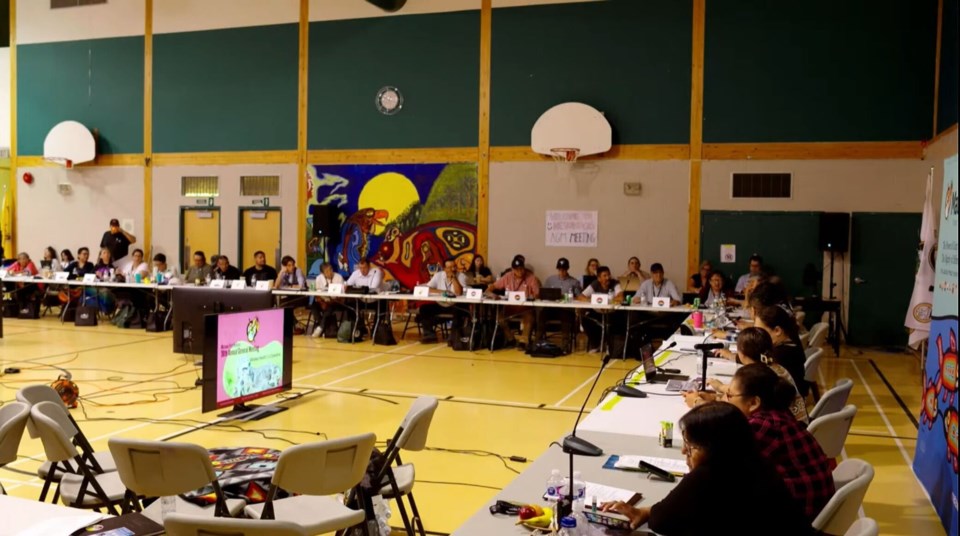NESKANTAGA FIRST NATION — Matawa Chiefs are hearing each other out.
The Matawa Chiefs Council and representatives from the nine Matawa First Nations met in Neskantaga First Nation from July 30 to Aug. 1 for their annual general meeting.
This marks 36 years for the Matawa gathering.
The annual general meeting provides community members and leaders with an opportunity to discuss progress made, challenges faced, and gives leaders a platform to openly voice the needs their communities.
Sol Mamakwa, MPP for Kiiwetinoong and deputy leader for the New Democratic Party, was in attendance. He highlighted the youth who were present at the AGM to speak about the mental health challenges and the effects of addiction on their communities.
He also stressed the importance of language.
“We need to continue to speak our language. Our languages are a way of life.
"Language is about identity, language is about healing, and I think all of us adults – whether it’s our grandkids or our children – we need to support them in learning their language because once we bring our language back that’s how our people will start standing as nations, rising as people,” he said.
Mamakwa recently made history when he addressed the Ontario Legislature entirely in Anishininiimowin, known in English as Oji-Cree.
At Matawa’s AGM, Mamakwa discussed the need to keep breaking down barriers at all levels and disrupt the cycle of perpetual crisis that has hindered many First Nations from focusing on other priorities
He gave examples such as working towards nationhood, building high schools for Indigenous youth in the north, ensuring First Nations communities are on the power grid, and making sure there are good language programs for youth to enroll in.
“I’ve been a member of provincial parliament over the last six years, and I get to hear stories – truth-telling stories – about the impacts of colonialism, the impacts of oppression, discrimination, and also racism.
"I know the constant struggles that we face in the north as First Nations people . . . over the years when you look at the systems in place, that is strategic underfunding.
“The systems that we see within First Nations programs and services, they are by design.
"They are working exactly the way they are designed to, which is to take away the rights of our people through the lands and the resources that we have in Northern Ontario. Every one of us, around the table, we are rights holders. We are lands-rights holders, we are treaty rights holders, [and] we are inherent rights holders. Nobody can take those away,” he said.
He further praised the work Matawa has been doing to revitalize language education.
Mamakwa’s remarks were followed by Abram Benedict, Ontario’s regional chief, who focused on how resource extraction is affecting Ontario’s northern First Nations.
“Many communities in this region deal with mining in different ways. We know there’s some communities who work with mining companies, some communities have agreements that bring opportunities, and some communities have challenges with mining – the staking of claims on our traditional territories that impedes the ability of our community expansion.
“It’s sessions like this where I listen-in [on] conversations and dialogue that gives me the ability to learn more about the mining aspect so that when I go into meetings – whether with Ontario or the federal government – I understand those impacts to your communities,” Benedict said.
Dougall Media spoke with Ginoogaming First Nation’s Chief Sheri Taylor, who was also in attendance at the AGM.
She said she was grateful for the chance to spend time with her fellow Matawa Chiefs.
“We don’t have a lot of time to get together too often but it was a time to listen to our program managers and services that we have under Matawa – to get those updates for the whole year,” she said.
She also noted the presence of Regional Chief Benedict and some thoughts she shared with him.
“I just gave him a message that if any discussions need to happen in regards to forestry, mining, energy – anything out there that has to do with resource extraction in our neck of the woods, in our backyards, our homelands – that we need to be a part of that discussion.
“And, I’d like to see a plan in how we can keep us as northern First Nations involved because a lot of discussions take place without us and that is unacceptable. I will not allow that to happen anymore.
“It’s important for us as communities to be heard and for us to be listened to so that there’s action,” she said.
